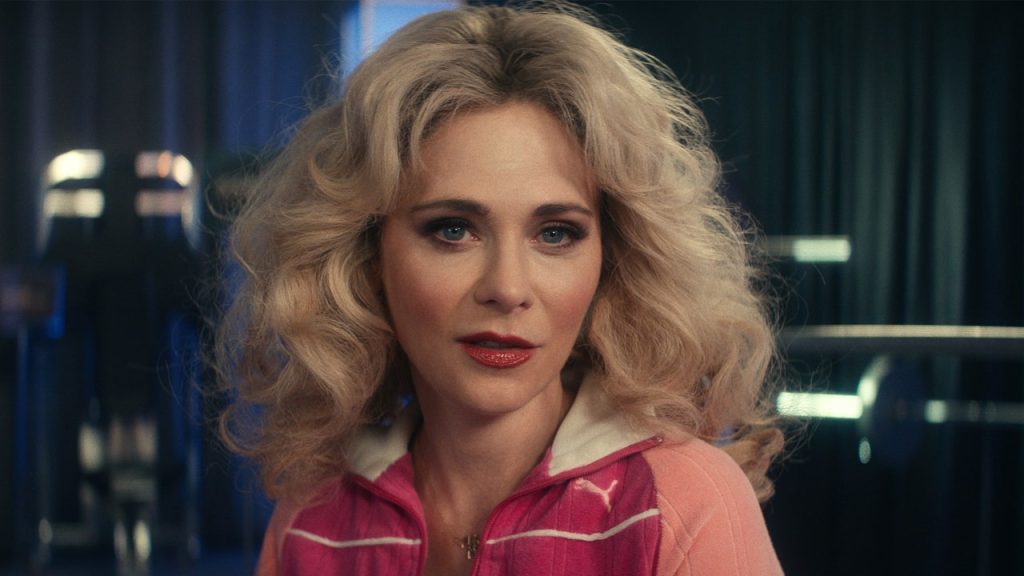If you’ve tuned in to season three of Physical, you may have done a double take when a biting but bubbly blonde first appeared onscreen. No, it’s certainly not Jessica Day: It’s Zooey Deschanel in the dual role of Kelly Kilmartin, rising celebrity exercise queen, and Kelly Kilmartin, vicious inner monologue of Sheila Rubin (Rose Byrne).
“I’m kind of good and bad—I’m like a frenemy. I’m fun, mean, sweet, all these different things at once,” Deschanel says of her series regular role over the phone from her home in Los Angeles, in an interview conducted before the SAG-AFTRA strike began. “It’s definitely a competitive relationship [between Sheila and Kelly].”
Deschanel’s role in the Apple TV+ series is notable for two reasons: It’s a departure from many of her previous roles as a quirky indie darling; it’s also her first return to scripted television since the beloved Fox comedy New Girl wrapped in 2018.
Deschanel had admittedly needed a break, and she wanted to spend time with her kids—eight-year-old Elsie Otter and six-year-old Charlie Wolf. So she took two years off, then said no to everything that came her way for the next few. After the rigorous experience of filming New Girl, which sometimes shot 25 episodes per season, she wasn’t exactly in the mindset to dive back in. “It was a huge undertaking,” she says. “I couldn’t picture myself getting back into the game like that, especially not right away.”
Deschanel was so burned out, she says, that she considered never returning to TV. “I thought maybe I would just do movies, or movies and music,” she says. “I needed to give myself the time to think about how much I could really take that on.”
The lull of the pandemic gave her plenty of time to do that. As she gradually began taking on movie roles again, an opportunity to star in Physical—a show she was already a fan of—was floated her way. “I only do stuff that I’m really excited about,” she says. And she was–—and is—excited about this one. “I love the show!” says Deschanel. “Annie [Weisman], who created the show, is just a super talent. I’m a big fan of Rose Byrne. The whole cast is just so great.”
She also couldn’t ignore the allure of playing two characters. “It’s the type of thing that when you’re in acting school, you’re like, I just hope somebody would be thoughtful enough to allow me to play something really unique that’s different from who I am as a person, allow me to really sink my teeth in something,” she says.
After 25 years in Hollywood, it felt good to be in this position. Deschanel had earned praise for her quirky yet deadpan roles in films like Almost Famous, The Good Girl, Our Idiot Brother, and Elf; she became the face of the manic-pixie-dream-girl trope after starring in the rom-com 500 Days of Summer. (She notes, however, that the term wasn’t originally coined for her: It was inspired by Kirsten Dunst’s character in Elizabethtown.)
“I would never use that label to describe myself as a human being,” she says. “It was a weird moniker that was clever, that got repurposed, and somehow I became the face of it in a lot of ways. But [it’s] absolutely not what I identify as.”
Deschanel thinks the epithet proves how 500 Days of Summer was misinterpreted when it was released in 2009. The film, she points out, is told entirely from the male lead’s perspective: “Summer isn’t really given even a chance to express who she is,” she says. “She’s very objectified, and that’s dehumanizing.” That’s another reason why she doesn’t identify with the manic-pixie-dream-girl label—it inherently objectifies the person it’s describing.
Deschanel is, however, thrilled to be the face of twee, especially considering how the aesthetic has made a resurgence on TikTok of late. “I love all the girlies doing twee,” she giggles. “I’m so here for it.”
